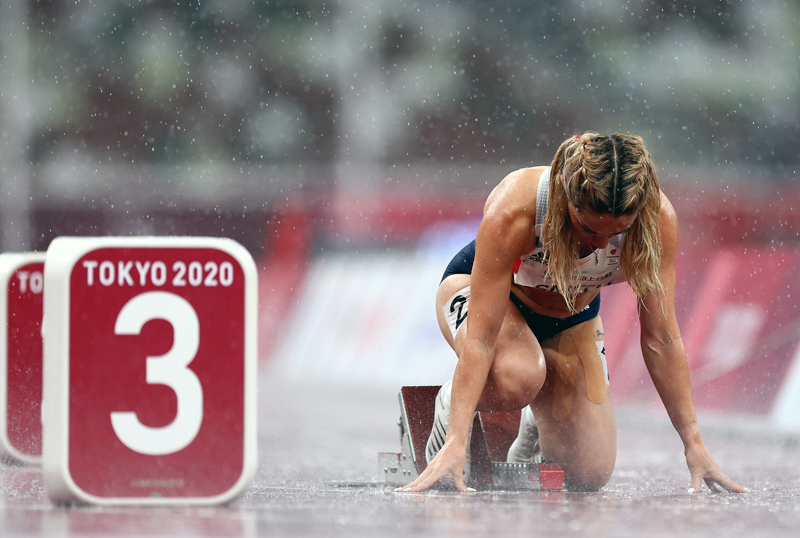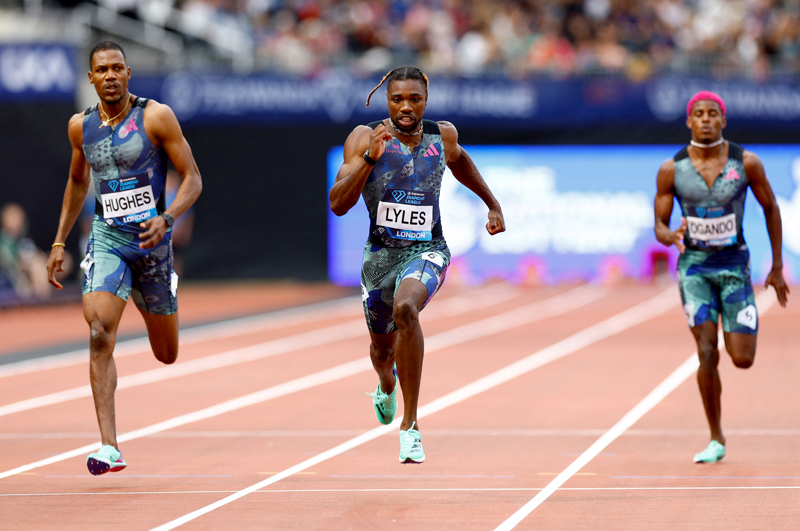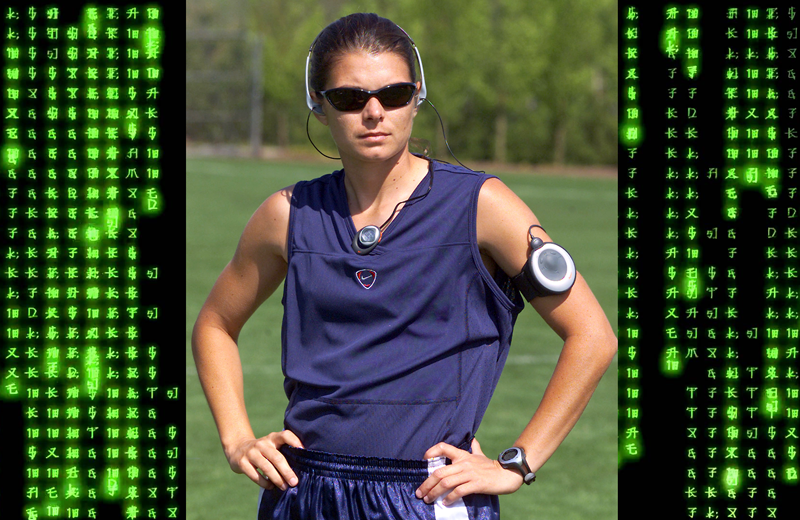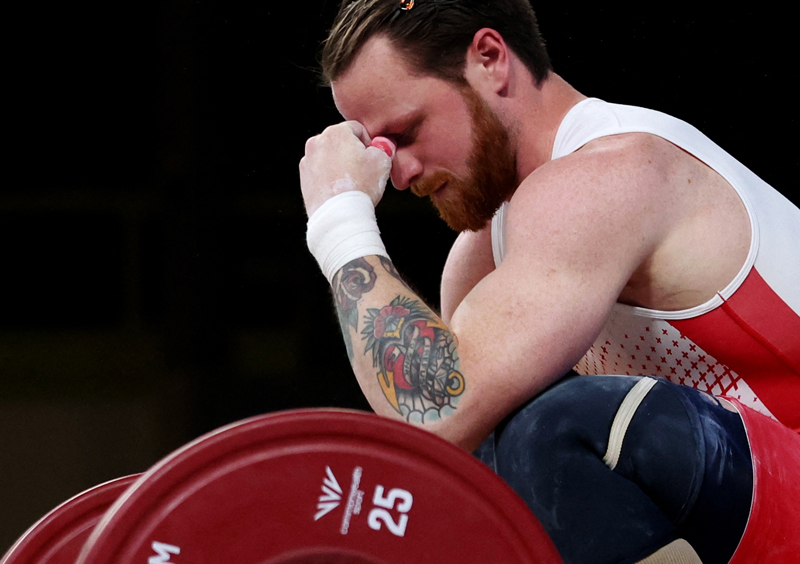You are viewing 1 of your 1 free articles. For unlimited access take a risk-free trial
Sprint performance: does coaching feedback matter?
How effective is a coach’s feedback for sprint athletes, and which kind of feedback is best for performance? Andrew Sheaff looks at new research
In most team sports, speed is king. Faster athletes are almost always going to have an advantage, whether that speed is in a single straight-line sprint, over a curved distance, or repeated multiple times. Unfortunately, top speed can be particularly difficult to improve, as the margins are so small and simply working harder doesn’t necessarily get the job done. Because it’s so difficult to improve, any training strategy that enhances performance is of great interest to coaches and athletes alike.
Feedback for sprinting
When performing sprint training, there is typically lots of time between each effort, which allows for communication between athletes and coaches, and for coaches to provide feedback. It’s widely accepted that different types of feedback during this period will produce varying degrees of effectiveness in terms of further facilitating performance. For example, coaches can provide no feedback, they can provide feedback about technique, or they can let athletes know how fast they’re running.
Further, there’s also the option of having athletes race other athletes during their training repetitions because doing so can promote competition, which may also positively affect performance - particularly when the competition is a relatively even one. There are also situations where athletes are training by themselves or with another teammate but with no coach; is there any type of feedback that’s most appropriate for these individuals, when they don’t have access to a coach?
Something else that needs to be considered is mood and motivation. Performance is not just about time; it’s possible, and even likely, that what happens during these rest periods can affect athletes’ mood and motivation. And any changes in mood or motivation, whether positive or negative, can have a major impact on the current training session, as well as subsequent training sessions.
So with all of these considerations, a pertinent question is what’s the best the strategy for providing feedback? Should athletes be competing with each other, or running solo? Is a coach giving feedback always effective and if so, what kind of feedback? These are questions scientists from Australia have sought to answer, in the hope of providing concrete answers for athletes and coaches.
The research
In this study, 12 female rugby players completed three different sprint tasks under four different conditions(1). The sprint tasks consisted of a 20-meter sprint, a 30-meter curved sprint, and a repeated sprint ability test. Athletes performed three runs for each task during each condition. However, each condition different in terms of how the sprints were performed:
* In the control condition, no information was provided to the subject.
* In the technique condition, the subject was provided technique feedback before and after each run.
* In the competition condition, the subject raced against another subject.
* In the augmented feedback condition, the subject was provided with their performance time after each repetition and reminded of it prior to the next repetition.
In addition to sprint times, athletes completed an ‘intrinsic motivation inventory and sports emotion questionnaire’ after the testing in order to examine the participants’ levels of mood and motivation. The mood testing assessed anxiety, dejection, excitement, anger, and happiness. The motivational questionnaire assessed enjoyment, effort, value, and perceived competence.
What they found
The results were quite surprising. In terms of linear speed, providing augmented feedback and using competition significantly improved performance relatively to control, whereas providing technique feedback from a coach (what is often assumed to be most effective) did not. The same results were seen for the curved agility test. There were no differences in performance for repeated sprint ability across all trials.
When it comes to maximal speed training performance, it appears that racing a competitor or simply knowing one’s performance will result in the most improvement, more so than getting technical feedback from a coach. This is a particularly interesting finding as most coaching is often centered around providing technique feedback, when it appears that simply telling athletes how fast they are running, or having them race, might be the best course of action!
While all conditions improve enjoyment relative to the control, it was only the augmented feedback condition that improved effort and value. Beyond the performance benefits, it appears that augmented feedback can improve motivational qualities associated with training, possibly enhancing willingness to continue to engage in challenging training. In contrast, there was no impact of testing condition on mood states.
Practical applications for athletes
Many athletes are aiming to improve their speed, yet don’t have access to regular coaching. They believe this puts them at a disadvantage because they don’t have access to technical feedback provided by a coach. The results of this study indicate that they won’t be at a disadvantage at all. On the contrary, they may even be better off without the feedback!
That’s not to diminish the value of a highly qualified coach, as they certainly give athletes much more than simply providing technical feedback. Indeed, the results might have been very different if a particularly knowledgeable coach was used - particularly one that was familiar with the athletes in the study.
However, the big takeaway point from this research is just how powerful it is to simply be aware of performance times. This study points to the value of knowing and measuring performance, as it appears that the simplest and most effective performance enhancer is keeping track of performance. Fortunately, expert coaching is not required to know how fast one is running.
For athletes that are training by themselves, it’s absolutely critical to keep track of performance as much as possible to optimize training quality. Obviously, gauging performance can present its own set of challenges. While timing gates are effective, they may not be accessible to everyone. However, if you are regularly training solo, it could be a wise investment.
If not, a simple stopwatch can get the job done. While it might not be the most accurate form of timing, provided that you’re timing consistently, it can help you gauge your progress, which is the important point. And if you don’t have access to timing equipment, find a training partner and race them! Racing is a superior strategy for improving performance as well.
Even better, focusing on performance increases effort and improves the value associated with the activity. This means that athletes are more likely to repeat these activities. As training can be particularly difficult and monotonous, any psychological benefit is potentially of value if it helps for athletes to continue to put in the work to accomplish their goals.
Reference
Int J Sports Physiol Perform. 2023 Feb 7;18(3):313-319. doi: 10.1123/ijspp.2022-0320
Related Files
Newsletter Sign Up
Testimonials
Dr. Alexandra Fandetti-Robin, Back & Body Chiropractic
Elspeth Cowell MSCh DpodM SRCh HCPC reg
William Hunter, Nuffield Health
Newsletter Sign Up
Coaches Testimonials
Dr. Alexandra Fandetti-Robin, Back & Body Chiropractic
Elspeth Cowell MSCh DpodM SRCh HCPC reg
William Hunter, Nuffield Health
Keep up with latest sports science research and apply it to maximize performance
Today you have the chance to join a group of athletes, and sports coaches/trainers who all have something special in common...
They use the latest research to improve performance for themselves and their clients - both athletes and sports teams - with help from global specialists in the fields of sports science, sports medicine and sports psychology.
They do this by reading Sports Performance Bulletin, an easy-to-digest but serious-minded journal dedicated to high performance sports. SPB offers a wealth of information and insight into the latest research, in an easily-accessible and understood format, along with a wealth of practical recommendations.
*includes 3 coaching manuals
Get Inspired
All the latest techniques and approaches
Sports Performance Bulletin helps dedicated endurance athletes improve their performance. Sense-checking the latest sports science research, and sourcing evidence and case studies to support findings, Sports Performance Bulletin turns proven insights into easily digestible practical advice. Supporting athletes, coaches and professionals who wish to ensure their guidance and programmes are kept right up to date and based on credible science.











